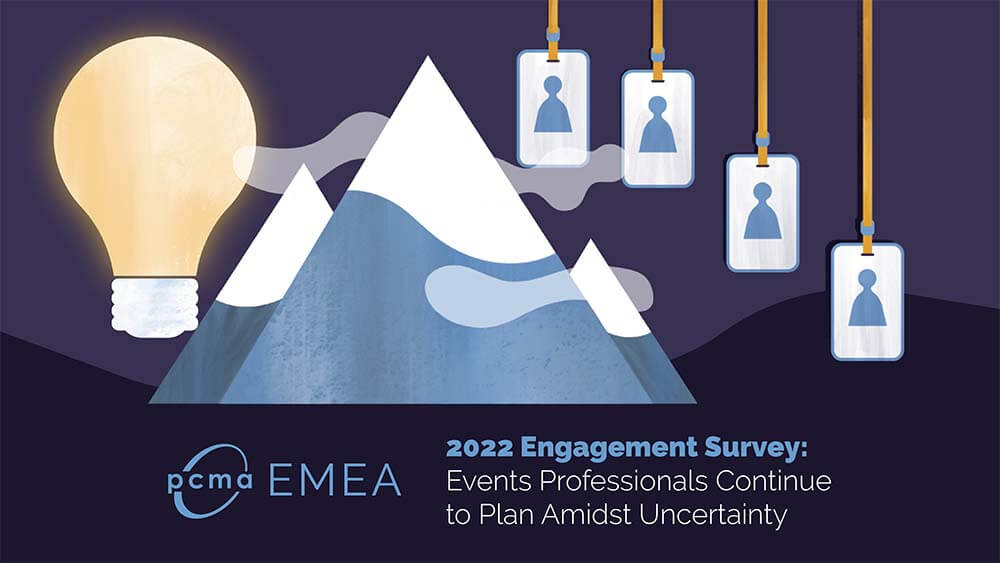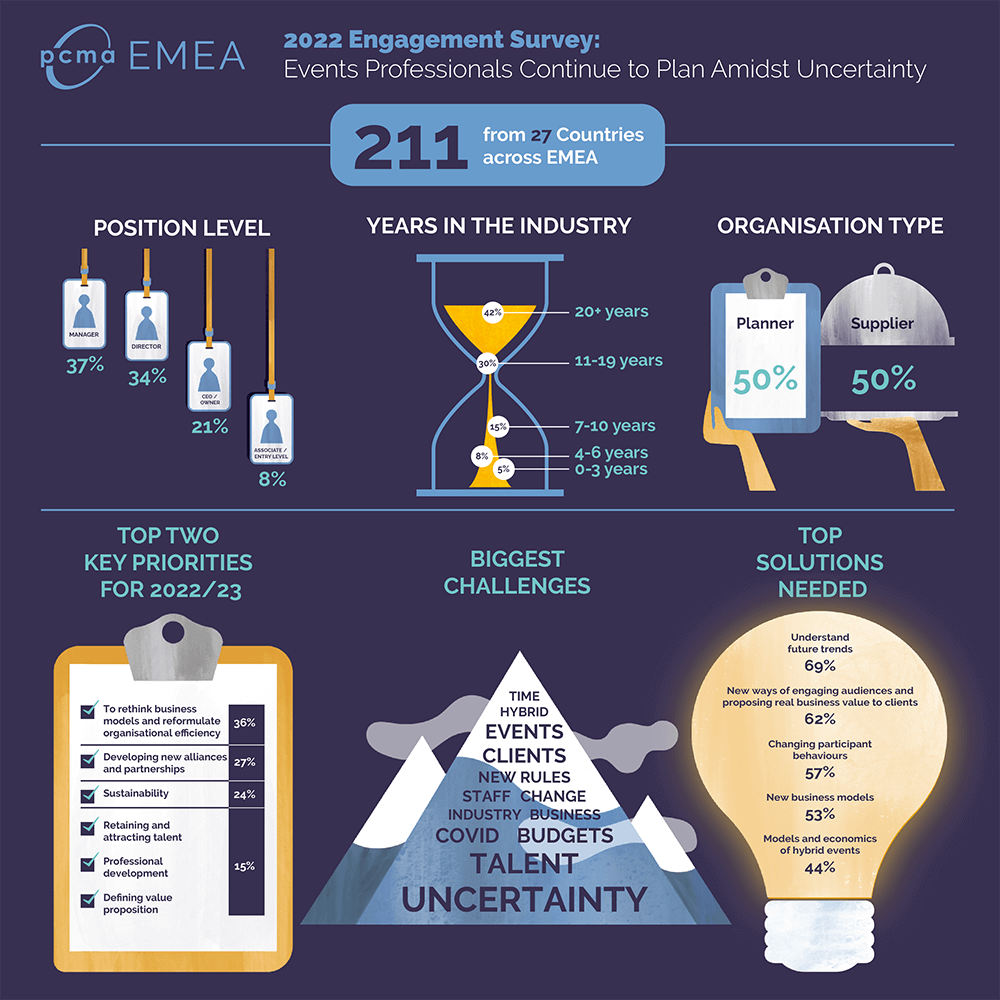Uncertainty. That was the one word cited most often as the biggest challenge facing 211 business event professionals in the EMEA region who responded to a PCMA survey. And this was in early February, before the Russian invasion of Ukraine created a humanitarian crisis in eastern Europe and set the entire world on edge.
While the fear of a world war may have since overshadowed COVID concerns, there is little doubt that the pandemic will continue to make planning events in 2022 and 2023 a challenge. One planner said s/he is navigating a “very unstable global environment with COVID where I am planning for an in-person event and then may need to pivot to virtual within a very short timeframe. Also, due to profit from events being down, event budgets have been slashed, including professional development.”
Other challenges facing planners and suppliers, who were evenly represented in the survey, include planning for COVID-related regulations/restrictions/travel bans, dealing with COVID protocols, successfully attracting on-site delegates and exhibitors, managing more work with fewer resources, and making do with smaller budgets and rising costs — especially expenses associated with putting on hybrid events.
Hybrid events came up often in the responses. While it was often identified as the path forward, respondents said that hybrid events brought their own set of challenges. One planner was trying to figure out how to manage “hybrid events in an affordable and scalable way. What should be digital and what should be in person? Is there a need for both at the same time?”
Another took exception to the term “hybrid,” saying it sounded negative and preferring to describe an event with in-person and virtual components as a “blended” experience. This planner was challenged with “regaining clients’ and partners’ confidence in future events” and building trust in those blended events.
Another respondent was finding it difficult to maintain “commitment from volunteer leadership after two years of only virtual meetings and making decisions for hybrid concepts with very little evidence and knowledge about delegates’ behaviour” — yet another element of uncertainty that needs to be factored into planning events this year and next.
When asked to identify their two key priorities for 2022/2023, more than one-third (36 percent) of respondents said they are focusing on rethinking business models and reformulating organisational efficiency. One planner alluded to this when commenting on challenges s/he faced: “Associations still rely heavily on revenue from congresses, so [the issue is] to get boards to continue evolving revenue sources and not think they can go back to one main source.” In other words, thinking the 2019 congress model will work in 2022/23. And a supplier responding to that same question, wrote: “Foreseeing the future needs of our clients and how a venue should adapt and review its business model.”
Developing new alliances and partnerships was the second most-popular priority, selected by 27 percent of survey participants, and sustainability was a close third at 24 percent. Survey takers were evenly concerned about retaining or attracting new talent, personal and professional development/career progression, and defining their value proposition (15 percent ticked each of those boxes).
Some respondents were more big-picture about their challenges and priorities — overcoming “resistance to change,” said one. Another event professional summed up the work ahead in one word: “Transformation.”
“There is no doubt that we will continue to operate in a world of uncertainty,” said Jaimé Bennett, PCMA’s regional director, EMEA, “as we navigate the implications of a pandemic — while trying to foresee the ramifications a war will have on the world we live in and the business events industry.
“As event professionals we are trained to plan for every eventuality, which certainly can be overwhelming in the current climate. However, what continues to stand out for me — including in the results of this survey — is the grit and resilience demonstrated by our community. This, coupled with passion and perseverance to unite now more than ever so that we can share knowledge, create new partnerships or alliances, and understand our future, gives me hope. We must create ways for our community to engage, contribute to and learn from each other, and build a stronger future for our industry and those in it.”
When asked what solutions or outcomes they are looking to gain from events they themselves attend, nearly three-quarters (72 percent) of respondents said they want to understand future trends, 65 percent are looking to find new ways of engaging audiences and providing value to clients, and 58 percent seek to understand changing participant behaviors. “The want and need to come together to understand and plan for our future is evident among our community,” Bennett said. “PCMA is committed to providing the environment to have these important conversations, share insights, and collaborate on solutions to move the business events industry forward. I passionately believe now is the time for action.”
Convening EMEA 2022 will take place in Vienna from 28-30 September, where the industry will unite to contribute, learn and develop actionable tactics to advance as individuals and organisations. Visit www.conveningemea.org for further information.
Participant Demographics
Most of the respondents work for a CVB/DMO (23 percent), followed closely by PCOs/meeting planners/DMCs (22 percent), and association planners (21 percent). The largest percentage (24 percent) live in the U.K., followed by Germany (11 percent), Switzerland, and Ireland (8 percent each).
Respondents to the survey are an experienced group: 42 percent have worked 20-plus years in the events industry and three out of 10 have spent 11-19 years in the business. The majority (37 percent) are at the managerial level; 34 percent are directors; and 21 percent are CEO/Owners.
Michelle Russell is editor in chief of Convene.


